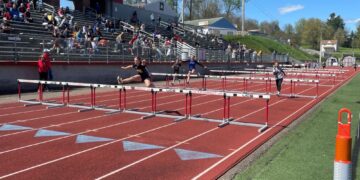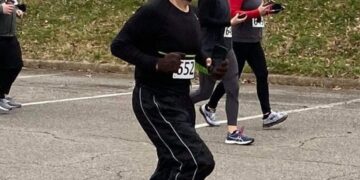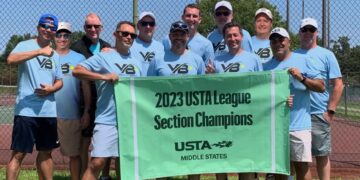Article from the Herald Star, By ASHLEY NEWMAN, Sports writer
STEUBENVILLE – When Bobby Douglas speaks, people listen.
Such is the respect owed to a man who revolutionized American wrestling as a competitor in the 1960s, winning five collegiate national titles and gaining silver and bronze medals as captain of the U.S. team in the 1968 Olympic Games.
The Bridgeport High School graduate then focused on coaching, where he first brought Arizona State to national prominence before pushing Iowa State to the top of the collegiate wrestling scene before retiring after the 2005-06 season.
Considering Douglas’ vast credentials, accomplishments, and accolades, his words were taken seriously when he visited the Smittyfloors.com Sportatorium Saturday, with a message of hope for area athletes.
“I know about the athletes of the Valley,” Douglas said. “There are a lot of talented athletes that never get out of the area. I want to open that door for them.”
Because of this knowledge of potential, Douglas is teaming up with Mike ‘Smitty’ Smith to make the Sportatorium one of nine Junior Olympics Wrestling regional training centers in the country.
“Smitty has created a regional training site here in Steubenville, which will serve to motivate a lot of the kids to continue their education,” Douglas said. “It will also upgrade the local kids as far as technique and training methods.
“I think that it will service the community in that it will give the kids of the Valley a chance to compete for scholarship money at the national level and it will also give them an opportunity to compete at the Olympic level.
“Our hope is that Smitty’s gym, along with the Hall of Fame, will create enough of a stir that we will rekindle the local interest in wrestling. I believe that wrestling services our kids moreso than any other sport in that it provides them with self-respect and it makes others respect them.”
The first step in making Steubenville and the Ohio Valley a hotbed of wrestling talent took place Saturday, when Douglas hosted several area high school coaches in a three-hour clinic, touching on a myriad of subjects all directed toward improving wrestling opportunities for local athletes.
“I thought that this was a great opening,” Douglas noted. “I wish there would have been more, but we didn’t do a very good job of really going after the coaches. The timing wasn’t the best, but we want this regional training site to get off and I think that, regardless of the attendance this time, it will grow.
“This will be an annual thing and, once Smitty’s gym starts to produce some results, I think you are going to see a lot more kids becoming involved in wrestling in the Valley. That is the goal.”
Smith was also expecting a bigger turnout, but the coaches that were in attendance were treated to the wise words of a wrestling icon.
“I would have liked to have seen more numbers,” Smith said. “I just don’t think that the Valley coaches understand the opportunity that they have with coach Douglas throwing himself back here. This guy could be in California or Oregon, but he is coming home.
“The one thing that I want to stress is that the wrestling community has to come together and support what we have going on here. People complain about wrestling being a dying breed, but they’re not helping things by not showing up.
“Coach Douglas could be on a beach somewhere. He doesn’t have to be here helping us. The class was awesome, though. I learned a whole lot and it was unbelievable to sit and listen to coach Douglas for three hours. I’m just not satisfied with the amount of Valley coaches that came out.”
Douglas came from humble beginnings, born-and-raised in a small town just outside of Bridgeport.
“I was raised in Blaine, Ohio and there are probably only four or five houses down now where I was raised,” he said. “There are not many opportunities for kids to use their lifetime skills and their professional skills.”
While he was small in stature, Douglas used wrestling to increase his self-confidence and gain the respect of peers.
“I always tell the story of me being the 88-pound weakling in high school and about how I was bullied,” he explained. “People picked on me and abused me until I got their respect and I got their respect by becoming a wrestler.
“Kids need to feel secure and they need to feel loved. Wrestling may not necessarily bring the love factor, but it certainly brings the secure factor.
“Once a kid becomes involved in wrestling, they develop self-respect and others respect them also. I think that this is one of the valuable tools that wrestling provides to our youth. Gaining self-respect and earning it is only something that someone who has been bullied or disrespected would understand.
“We all have been there at one time or another. Once you become a wrestler, no one tries to bully you.”
It wasn’t long before the hours of practice began to pay dividends, not just in greater respect from classmates, but with accolades on the mat.”
Douglas became the first African American state titlist in the Ohio High School Athletic Association’s history when he took the 112-pound crown in 1959. He claimed his second state championship two years later in the 127-pound final.
Douglas then attended West Liberty State College, where he won an NAIA title in 1962 and finished second in 1963 before transferring to Oklahoma State, where he won the Big Eight title in 1965, but sustained an injury that hindered his performance at nationals.
However, getting the opportunity to get a college education was always the most important aspect for the grappler.
“The greatest value for me is to watch these kids go on to college and become teachers, coaches and mentors,” said Douglas. “That’s my great desire and I was fortunate that my coach came into my life and was able to influence me and get me on and keep me on the right track.
“In return, I’m going to do the same thing. One of the things that we can do is to make sure that they have an opportunity to reach their wrestling potential, which will take them far in life.”
Douglas graduated from Oklahoma State in 1967 and he had the successful Olympic campaign, he set his sights on becoming that coaching role model that he so appreciated as a young wrestler.
After one year at California-Santa Barbara, Douglas became the head man at Arizona State in 1974. He built the program to one of the nation’s elite wrestling schools and, in 1987-88, he led the squad to a national title.
In 1991-92, Douglas opted to move to power Iowa State where he competed for national titles nearly every season.
When he finally retired in 2005-06, Douglas’ coaching resume included 13 NCAA individual champions, 68 individual conference titles, and 400 winning dual meets.
While his accomplishments speak for themselves, it took an adjustment to live life without coaching.
“I went through the withdrawals of losing my coaching position,” Douglas said. “I had excellent support, because it was very, very difficult. Something that you’ve done for as many years as I did and to be taken off the scene was a challenge.
“There are parts of it that I miss, like the relationships with the kids and I miss the relationships with my fellow coaches.”
Now, he is taking his mentorship on the road, preaching the benefits of wrestling to communities around the country.
“Moving on from coaching is a challenge that I think I’ve met,” he said. “I won’t be the judge of how well I’ve accepted it, but I will say that I’m as energized now as I ever was as a coach. I’m completely happy and content with what I am doing now.
“I’m going to grow wrestling for America, because I love working with kids and I love my country. I’m going to do everything that I can to give our country and our kids and equal opportunity to compete for the gold medals.”
After all that he has given to the sport, Douglas still feels as though he owes wrestling and he is determined to continue to spread the word.
“I owe a tremendous debt to wrestling and I’m trying to repay a portion of it by bringing a world-class wrestling program back to the Valley,” he said. “We’re going to use Smitty’s gym to help stimulate and develop the wrestling programs around the Valley and I think that in a short period of time, we will see some very good results.”
Douglas said that the choice of Steubenville for the regional training center for the Junior Olympic was an easy one.
“This is a no-brainer for me. I wanted to come back home and give back,” Douglas commented. “I have worked with other states and other sites, but there is an immediate need here. The kids of the Valley need this.
“They need an opportunity to go to school and they need an opportunity to compete for the gold medals at the state level, national level, and international level.
“That’s what we want to do.”
Douglas has other goals in mind for the area, as well.
“We also want to make sure that the Valley is represented in the Ohio National Wrestling Hall of Fame,” he said. “Our goal is to motivate kids and to grow wrestling. We want to give them the opportunity to participate in a sport that will help educate them and provide them with the tools that are necessary for the youth of today.”
According to Smith, Douglas will be a fixture in the Ohio Valley wrestling scene as the program begins to take hold and more events are planned.
“Our next big push we have coming is the Fall Brawl,” Smith said. “That is in its eighth year and it is down at Steubenville High School on Nov. 7. We’re hoping that we are going to be getting some pretty big names in for that.
“We are probably going to have an Olympic gold medalist come in for a clinic prior to that and coach Douglas is going to come back for it. I think that the thing wrestling teaches is work ethic. I think that is why I have been able to build my business. I credit the work ethic that I learned from wrestling.”





























